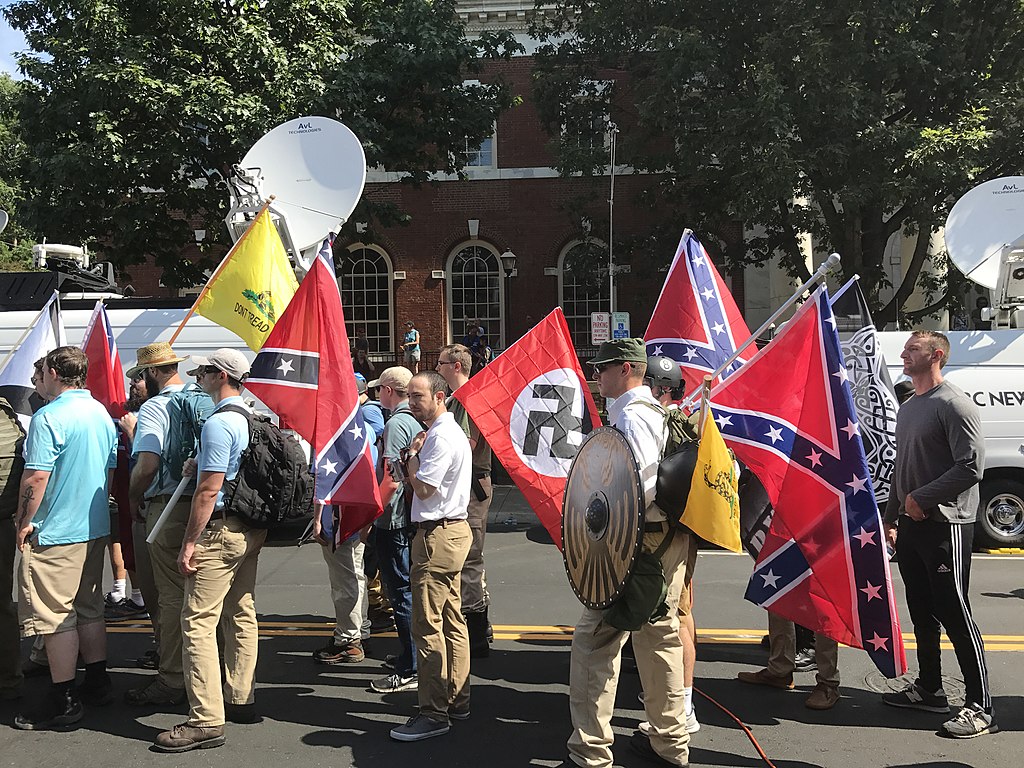Please Don’t Punch the Nazis
I’m not sure what to call the August 11 fascist cosplay in Charlotte VA. Ridicule and mockery seem out of place when discussing an event where organizers called for, and followed through with, the execution of other human beings. Whatever that display of vileness is called, the leaders are afraid to show their faces in public. Richard Spencer, the punched-face of Neo-Nazism is reportedly afraid to leave his home for fear of, well, being punched. He whinges, “I have never felt like the government or police were against me. There has never been a situation in my life when I’ve felt this way.” He has not found common ground with Black Lives Matter, The Anti-Defamation League or any other group he wants to eradicate from the earth. He feels oppressed because the police are not sufficiently protecting and assisting his efforts to foment genocide.
Predictably, people are defending Spencer’s right to free speech. But others go further, suggesting that we need to listen and understand Spencer’s disturbing words to really “be the republic we claim to be.” This is nice sentiment, but more people agree with Jake Blues. We hate Nazis, Illinois and otherwise. Google image search for “punch a Nazi” will show you Spencer’s bloodied face. These pictures warm my heart. I can recognize that he is human but I have lost all empathy for his humanity. I hate Nazi’s, and this is a problem in a society that pretends to be diverse.
Hatred comes in many forms. Simple hatred is a strong aversion to someone or something. This feeling is not accompanied by malice. I feel this way about people who touch my arm when they talk to me. I don’t want them to come to harm. I want them to go away. Personal hatred is different. Personal hatred is an aversion to a person with malice. I am a firm proponent of personal hatred. There are things one person can do to another that do not rise to the level of legal harm but still merit retributive punishment administered interpersonally. This is not the hatred I feel towards Nazis. A Nazi has never done anything to me personally. To the best of my knowledge, I’ve never met one.
I feel moral hatred towards Nazis. Moral hatred is the intense aversion to a person, with malice, based on the person’s beliefs and values. We hate Nazis for being Nazis. We hate them because they value and respect what we find abhorrent. The malice involved in moral hatred of Nazis is more than just the desire to punch one. Moral hatred is the active desire that the hated person fail in all their life’s plans. That all their goals come to nothing. That they suffer the agonizing sting of eternal failure. Kant wrote that happiness is not the result of being good. Being good is a prerequisite for deserving happiness. Moral hatred begins in this intuition. A person who is not good has not earned the right to be happy. But what does this mean in a world with so many different conceptions of the good?
I don’t believe that we are all basically alike, that if we just understand each other we will all get along. People have irreducibly different values. These values are the lens through which we understand the world. At the most fundamental level, my value-laden understanding of what it is to be human differs from Spencer’s. We will never agree on what follows from that foundational belief. In a genuinely diverse society people will hold radically different values with nothing beyond the most superficial common ground. This is why moral hatred is so problematic.
It is comforting to focus on Nazis. If our republic allows people the maximum scope to live according to their own values, then certainly, there are some values systems that are incompatible with such a diverse society. Spencer’s values legitimately preclude his engagement in civil society. There is a case to be made for denying him freedom of speech. Certainly, the German government thinks so, and they have the most experience with Nazis. They should never be free to live their values and be happy. Rejecting Nazism because it is incompatible with everyone’s liberty to live their own values is different from hating Nazis. If we condone hatred and malice based on values it is hard to see where that stops.
If we are honest, there are values systems expressed in our communities that we find objectionable, even threatening. I want my children to grow up with my values. I want to live with people who share my values. I have difficulty relating to someone who does not have the same values-based emotional responses to the world as I do. Competing values systems are a threat to everything I hold most important. In short I am human. The basic emotional response we have to any significantly different values system too easily turns into the moral hatred. This hatred is most often seen between religious groups. It is increasingly common between political factions.
I flatter myself that I enjoy the company of people with radically different values. But I have neighbors who do not. I have neighbors who do not allow their children to play with my children because we are not Christian. I reject the values that make their life meaningful. It is mutual. If my neighbor does not want to associate with me he has that right. Still, we can coexist. We do not like, trust or, unless we can’t avoid it, speak to each other. We each live happy, if separate, lives a mere 20 yards from each other. For too many people, moral hatred makes even this impossible.





